Daily Vocabulary Words: List of Daily Used Words in Leading International Newspapers
Hi there. Welcome to this special section @ Wordpandit.
Our endeavour here is very simple: to highlight important daily vocabulary words, which you would come across in leading newspapers in the country. We have included the following newspapers in our selection:
• The New York Times
• The Washington Post
• Scientific American
• BBC
• The Guardian
• Psychology Today
• Wall Street Journal
• The Economist
We are putting in extensive work for developing your vocabulary. All you have got to do is be regular with this section and check out this post on a daily basis. This is your repository of words that are commonly used and essentially, we are posting a list of daily used words. Hence, this has significant practical application as it teaches you words that are used commonly in leading publications mentioned above.
Visit the website daily to learn words from leading international newspapers.
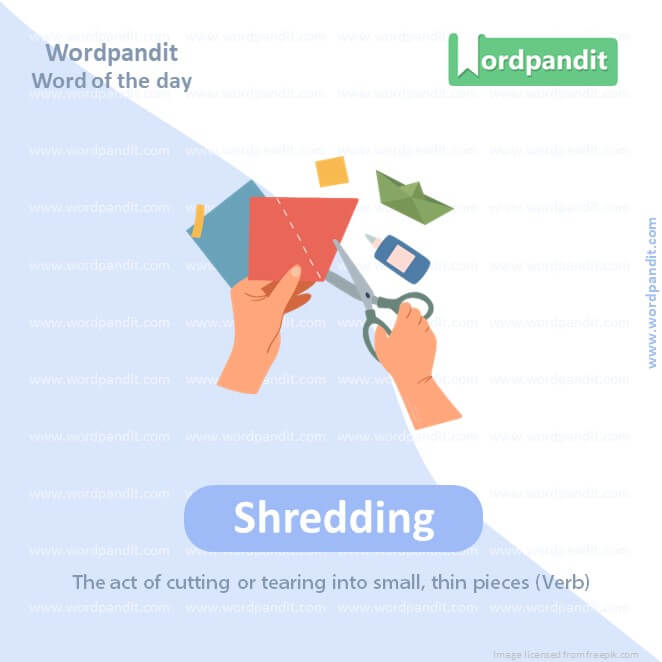
WORD-1: Shredding
CONTEXT: An inflow of migrants and asylum seekers is threatening its sovereignty and shredding control of its borders.
SOURCE: Guardian
EXPLANATORY PARAGRAPH: Shredding is like tearing something into small pieces, similar to how you might tear up a piece of paper into tiny bits.
MEANING: The act of cutting or tearing into small, thin pieces (Verb).
PRONUNCIATION: SHRED-ing
SYNONYMS: Tearing, cutting, fragmenting, disintegrating, pulverizing
USAGE EXAMPLE:
1. She was shredding old documents to dispose of them safely.
2. The machine is designed for shredding paper into confetti.
3. Shredding the cabbage for the salad took some time.
4. He enjoyed the sound of shredding leaves while gardening.
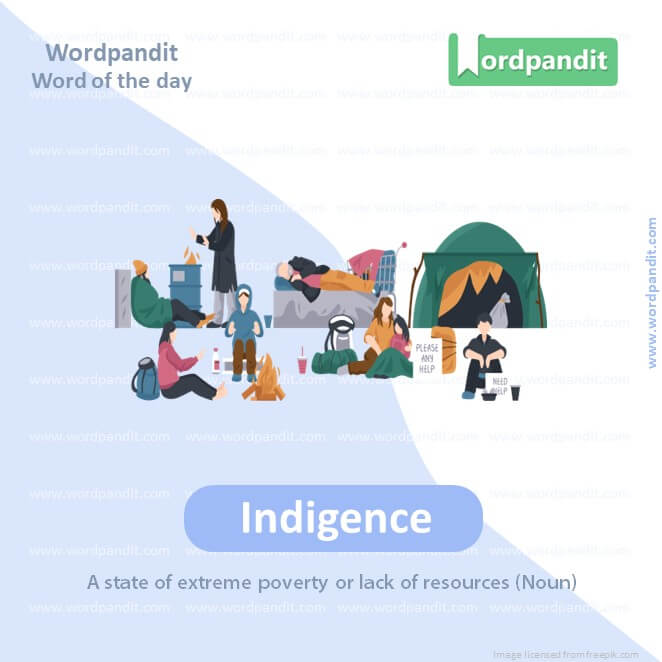
WORD-2: Indigence
CONTEXT: Rwanda’s indigence allows Britain to use its economic heft to dump on it those it regards as unwanted.
SOURCE: Guardian
EXPLANATORY PARAGRAPH: Indigence is like extreme poverty or lack of basic necessities, similar to not having enough food, shelter, or clothing.
MEANING: A state of extreme poverty or lack of resources (Noun)
PRONUNCIATION: IN-di-jens
SYNONYMS: Poverty, destitution, hardship, deprivation, penury
USAGE EXAMPLE:
1. The charity aimed to help families living in indigence.
2. His childhood was marked by years of indigence and struggle.
3. The government programs targeted areas with high levels of indigence.
4. Indigence often leads to health problems and social challenges.
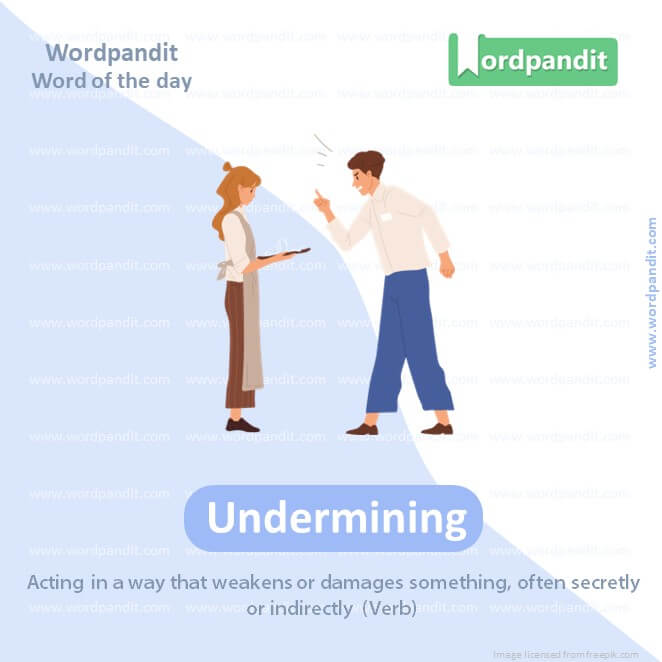
WORD-3: Undermining
CONTEXT: The EU is ripping up the sovereignty of African nations, distorting local economies and undermining democracy.
SOURCE: Guardian
EXPLANATORY PARAGRAPH: Undermining is like weakening or sabotaging something from below, similar to digging under a structure to make it unstable.
MEANING: Acting in a way that weakens or damages something, often secretly
or indirectly (Verb)
PRONUNCIATION: uhn-der-MY-ning
SYNONYMS: Sabotaging, weakening, subverting, undercutting, destabilizing
USAGE EXAMPLE:
1. His actions were seen as undermining the team’s efforts.
2. The leaked information was aimed at undermining the company’s reputation.
3. Constant criticism can be a form of undermining confidence.
4. The erosion was slowly undermining the stability of the cliffs.
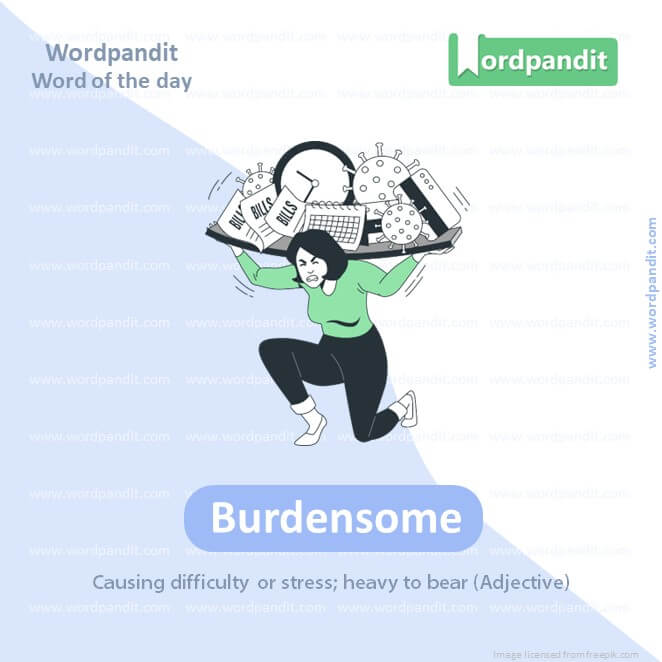
WORD-4: Burdensome
CONTEXT: The real issue is not one of burdensome numbers but the lack of legal routes to claim asylum – and the failure to adequately process claims.
SOURCE: Guardian
EXPLANATORY PARAGRAPH: Burdensome is like something that is very heavy or difficult to bear, similar to carrying a heavy load on your back.
MEANING: Causing difficulty or stress; heavy to bear (Adjective)
PRONUNCIATION: BUR-dn-suhm
SYNONYMS: Oppressive, heavy, onerous, cumbersome, taxing
USAGE EXAMPLE:
1. The new regulations placed a burdensome administrative load on businesses.
2. The debt became burdensome and difficult to manage.
3. The decision to move was burdened with burdensome paperwork.
4. The responsibilities of the new role felt burdensome at first.
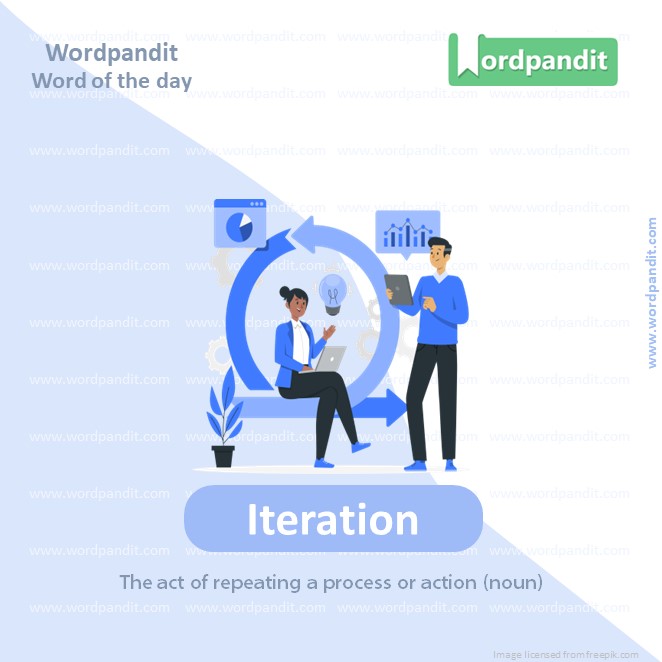
WORD-5: Iteration
CONTEXT: It’s a particularly apt description of the latest iteration of the plan – the Safety of Rwanda bill.
SOURCE: Guardian
EXPLANATORY PARAGRAPH: Iteration is like doing something over and over again, similar to practicing a song on the piano until you get it right.
MEANING: The act of repeating a process or action (noun)
PRONUNCIATION: ih-tuh-RAY-shun
SYNONYMS: Repetition, reiteration, recurrence, repetition, redoing
USAGE EXAMPLE:
1. The design went through several iterations before final approval.
2. Iteration is an essential part of the development process.
3. He requested an iteration of the contract to include new terms.
4. The software undergoes regular iterations to fix bugs and add features.
WORD-6: Deflecting
CONTEXT: It is also a propaganda exercise, a means of deflecting blame for failures of social policy from those policies themselves.
SOURCE: Guardian
EXPLANATORY PARAGRAPH: Deflecting is like redirecting something away, similar to how a shield can deflect arrows or attacks.
MEANING: Turning aside or redirecting something (verb).
PRONUNCIATION: dih-FLEK-ting
SYNONYMS: Redirecting, turning aside, deviating, veering, diverting
USAGE EXAMPLE:
1. Her calm response had a deflecting effect on the argument.
2. The mirrors were strategically placed for deflecting sunlight into the room.
3. Deflecting criticism with humor can lighten the mood.
4. The politician was skilled at deflecting difficult questions.
WORD-7: Scandalously
CONTEXT: It could easily do so by increasing spending on social care to help raise scandalously low wages.
SOURCE: Guardian
EXPLANATORY PARAGRAPH: Scandalously is like behaving in a way that causes scandal or shock, similar to doing something outrageous or improper.
MEANING: In a disgraceful or shameful manner, causing general public outrage (Adverb)
PRONUNCIATION: SKAN-dl-us-lee
SYNONYMS: Shockingly, outrageously, scandalously, improperly, disgracefully
USAGE EXAMPLE:
1. The scandalously high prices drew public outrage.
2. The celebrity’s scandalous behavior was captured by the media.
3. The scandalously false accusations damaged his reputation.
4. The book was criticized for its scandalously explicit content.
WORD-8: Rhetoric
CONTEXT: The logic of performative policymaking is the need continually to ratchet up the rhetoric.
SOURCE: Guardian
EXPLANATORY PARAGRAPH: Rhetoric is like using persuasive language or speech, similar to making a convincing argument or presentation.
MEANING: The art of effective or persuasive speaking or writing (noun)
PRONUNCIATION: RET-uh-rik
SYNONYMS: Persuasion, oratory, eloquence, speech-making, argumentation
USAGE EXAMPLE:
1. His rhetoric swayed many voters during the election campaign.
2. The speech was full of powerful rhetoric and emotional appeals.
3. Rhetoric plays a significant role in debates and public speaking.
4. The rhetoric of the advertisement aimed to persuade consumers.
WORD-9: Anointing
CONTEXT: The Time magazine person of the year to use their illustrious anointing to air old beef?
SOURCE: Guardian
EXPLANATORY PARAGRAPH: Anointing is like applying oil or ointment as part of a religious or ceremonial ritual, similar to receiving a blessing or consecration.
MEANING: Applying oil or ointment in a religious or ceremonial act (verb/noun).
PRONUNCIATION: uh-NOY-ting
SYNONYMS: Consecrating, blessing, sanctifying, appointing, ordaining
USAGE EXAMPLE:
1. The priest performed the anointing of the sick.
2. Anointing with oil is a symbol of blessing in many cultures.
3. The king’s anointing ceremony was attended by dignitaries.
4. Anointing is often part of religious rites and rituals.
WORD-10: Infestation
CONTEXT: It later transpired the recording was (allegedly) edited, but not before Swift was denounced as a snake (cue a global infestation of snake emojis on social media).
SOURCE: Guardian
EXPLANATORY PARAGRAPH: Infestation is like being overrun or invaded by pests or unwanted creatures, similar to having a lot of insects in your house.
MEANING: The presence of large numbers of pests or parasites in a place (noun)
PRONUNCIATION: in-fes-TAY-shun
SYNONYMS: Invasion, plague, invasion, swarm, infestation
USAGE EXAMPLE:
1. The house had an infestation of termites that required professional treatment.
2. Infestation of pests can damage crops and property.
3. The city dealt with an infestation of rats in certain neighborhoods.
4. Regular pest control measures can prevent infestation problems.
Vocabulary Hard Words
The experience of unraveling the depths of language learning often leads us to ‘vocabulary hard words’. These challenging jargons might seem daunting initially, but with the right learning strategies, the enigma of ‘vocabulary hard words’ can turn into an enticing quest. But how can these ‘vocabulary hard words’ be learned effectively?
Firstly, to master ‘vocabulary hard words’, it’s vital to break down the process into manageable steps. Instead of tackling several words at once, focus on understanding a few each day. This gradual approach ensures effective retention and understanding.
Multimedia resources tremendously aid in comprehending ‘vocabulary hard words’. Movies, podcasts, or even music in the target language contribute a comprehensive perspective. They provide real-life contexts and usages of ‘vocabulary hard words’, making them more understandable and less intimidating.
The incorporation of memory-enhancing techniques, such as flashcards or digital apps, can significantly bolster the retention of ‘vocabulary hard words’. Such tools encourage active recall, helping to cement these words into your long-term memory. Mnemonic devices can also aid in making these words more approachable by associating the hard words with relatable images or stories.
Practice is decisive when learning ‘vocabulary hard words’. Using these words in your conversations, written communications, or even social media posts will facilitate a robust understanding and recall.
Finally, do not worry about making mistakes while using ‘vocabulary hard words’. Mistakes are essential stepping stones in the learning process. They provide insights into areas that need more focus and help refine your grasp over these words.
In conclusion, grasping ‘vocabulary hard words’ is undoubtedly a challenging task but not an insurmountable one. With the aid of effective strategies including graded learning, multimedia resources, memory-enhancing tools, and regular practice, the process of mastering ‘vocabulary hard words’ can become an engaging and rewarding journey.











